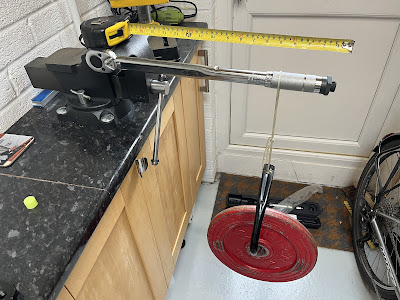A couple of weekends ago I managed to damage the thread on the crank axle bolt of my XTR M9100 chainset. It was really annoying, partly because I had a bike race the next day, but mainly because I felt it start to fail at a torque that was below Shimano's recommend torque setting of 45-55 Nm. The bolt gave me that tell-tale sign of a problem, where it starts to turn more than it should, and without the resistance increasing in the way it should. This happened before my torque wrench was able to click when set to 42Nm, below the recommended torque setting.
I got a replacement bolt, but it made me wonder whether my torque wrench was badly calibrated. It's a really cheap torque wrench, a budget Silverline torque wrench, bought from Toolstation, so it's quite possible that it's badly calibrated.
Anyway, I decided to use my workbench vice and hang a weight off the torque wrench, at several torque settings, then see at what distance (moment arm) the weight has to be at to cause the torque wrench to click.
The results, plotted below, shows that my torque wrench clicks out at a slightly lower torque than indicated on the wrench. This means that it's safe, in that it won't over-torque a bolt. It means that the reason my XTR chainset bolt got threaded is a bit of a mystery, but it's probably because the Shimano bolt was faulty, rather than an issue with my torque wrench.
28 Nm on wrench
260mm with 10.15kg (99.57N)
= 25.88 Nm applied
36 Nm on wrench
320mm with 10.15kg (99.57N)
= 31.86 Nm applied
42 Nm on wrench
370mm with 10.15kg (99.57N)
= 36.84 Nm applied
46 Nm on wrench
402mm with 10.15 (99.57N)
= 40.03 Nm applied






